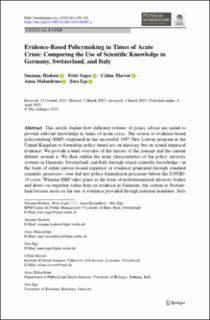Please use this identifier to cite or link to this item:
https://doi.org/10.21256/zhaw-26213Full metadata record
| DC Field | Value | Language |
|---|---|---|
| dc.contributor.author | Hadorn, Susanne | - |
| dc.contributor.author | Sager, Fritz | - |
| dc.contributor.author | Mavrot, Céline | - |
| dc.contributor.author | Malandrino, Anna | - |
| dc.contributor.author | Ege, Jörn | - |
| dc.date.accessioned | 2022-11-25T11:53:27Z | - |
| dc.date.available | 2022-11-25T11:53:27Z | - |
| dc.date.issued | 2022 | - |
| dc.identifier.issn | 0032-3470 | de_CH |
| dc.identifier.issn | 1862-2860 | de_CH |
| dc.identifier.uri | https://digitalcollection.zhaw.ch/handle/11475/26213 | - |
| dc.description.abstract | This article studies how different systems of policy advice are suited to provide relevant knowledge in times of acute crisis. The notion of evidence-based policymaking (EBP) originated in the successful 1997 New Labour program in the United Kingdom to formulate policy based not on ideology but on sound empirical evidence. We provide a brief overview of the history of the concept and the current debates around it. We then outline the main characteristics of the policy advisory systems in Germany, Switzerland, and Italy through which scientific knowledge-in the form of either person-bound expertise or evidence generated through standard scientific processes-was fed into policy formulation processes before the COVID-19 crisis. Whereas EBP takes place in the form of institutionalized advisory bodies and draws on expertise rather than on evidence in Germany, the system in Switzerland focuses more on the use of evidence provided through external mandates. Italy has a hybrid politicized expert system. The article then analyzes how this different prioritization of expertise vs. evidence in the three countries affects policymakers' capacity to include scientific knowledge in policy decisions in times of acute crisis. The comparison of the three countries implies that countries with policy advisory systems designed to use expertise are better placed to incorporate scientific knowledge into their decisions in times of acute crisis than are countries with policy advisory systems that relied primarily on evidence before the COVID-19 crisis. | de_CH |
| dc.language.iso | en | de_CH |
| dc.publisher | Springer | de_CH |
| dc.relation.ispartof | Politische Vierteljahresschrift | de_CH |
| dc.rights | http://creativecommons.org/licenses/by/4.0/ | de_CH |
| dc.subject | COVID-19 | de_CH |
| dc.subject | Crisis management | de_CH |
| dc.subject | Evidence-based policy | de_CH |
| dc.subject | Expert system | de_CH |
| dc.subject.ddc | 320: Politik | de_CH |
| dc.title | Evidence-based policymaking in times of acute crisis : comparing the use of scientific knowledge in Germany, Switzerland, and Italy | de_CH |
| dc.type | Beitrag in wissenschaftlicher Zeitschrift | de_CH |
| dcterms.type | Text | de_CH |
| zhaw.departement | School of Management and Law | de_CH |
| zhaw.organisationalunit | Institut für Verwaltungs-Management (IVM) | de_CH |
| dc.identifier.doi | 10.1007/s11615-022-00382-x | de_CH |
| dc.identifier.doi | 10.21256/zhaw-26213 | - |
| dc.identifier.pmid | 35399336 | de_CH |
| zhaw.funding.eu | No | de_CH |
| zhaw.issue | 2 | de_CH |
| zhaw.originated.zhaw | No | de_CH |
| zhaw.pages.end | 382 | de_CH |
| zhaw.pages.start | 359 | de_CH |
| zhaw.publication.status | publishedVersion | de_CH |
| zhaw.volume | 63 | de_CH |
| zhaw.publication.review | Peer review (Publikation) | de_CH |
| zhaw.author.additional | No | de_CH |
| zhaw.display.portrait | Yes | de_CH |
| Appears in collections: | Publikationen School of Management and Law | |
Files in This Item:
| File | Description | Size | Format | |
|---|---|---|---|---|
| 2022_Hadorn-etal_Evidence-based-policymaking-in-acute-crisis_PVS.pdf | 393.09 kB | Adobe PDF |  View/Open |
Show simple item record
Hadorn, S., Sager, F., Mavrot, C., Malandrino, A., & Ege, J. (2022). Evidence-based policymaking in times of acute crisis : comparing the use of scientific knowledge in Germany, Switzerland, and Italy. Politische Vierteljahresschrift, 63(2), 359–382. https://doi.org/10.1007/s11615-022-00382-x
Hadorn, S. et al. (2022) ‘Evidence-based policymaking in times of acute crisis : comparing the use of scientific knowledge in Germany, Switzerland, and Italy’, Politische Vierteljahresschrift, 63(2), pp. 359–382. Available at: https://doi.org/10.1007/s11615-022-00382-x.
S. Hadorn, F. Sager, C. Mavrot, A. Malandrino, and J. Ege, “Evidence-based policymaking in times of acute crisis : comparing the use of scientific knowledge in Germany, Switzerland, and Italy,” Politische Vierteljahresschrift, vol. 63, no. 2, pp. 359–382, 2022, doi: 10.1007/s11615-022-00382-x.
HADORN, Susanne, Fritz SAGER, Céline MAVROT, Anna MALANDRINO und Jörn EGE, 2022. Evidence-based policymaking in times of acute crisis : comparing the use of scientific knowledge in Germany, Switzerland, and Italy. Politische Vierteljahresschrift. 2022. Bd. 63, Nr. 2, S. 359–382. DOI 10.1007/s11615-022-00382-x
Hadorn, Susanne, Fritz Sager, Céline Mavrot, Anna Malandrino, and Jörn Ege. 2022. “Evidence-Based Policymaking in Times of Acute Crisis : Comparing the Use of Scientific Knowledge in Germany, Switzerland, and Italy.” Politische Vierteljahresschrift 63 (2): 359–82. https://doi.org/10.1007/s11615-022-00382-x.
Hadorn, Susanne, et al. “Evidence-Based Policymaking in Times of Acute Crisis : Comparing the Use of Scientific Knowledge in Germany, Switzerland, and Italy.” Politische Vierteljahresschrift, vol. 63, no. 2, 2022, pp. 359–82, https://doi.org/10.1007/s11615-022-00382-x.
Items in DSpace are protected by copyright, with all rights reserved, unless otherwise indicated.